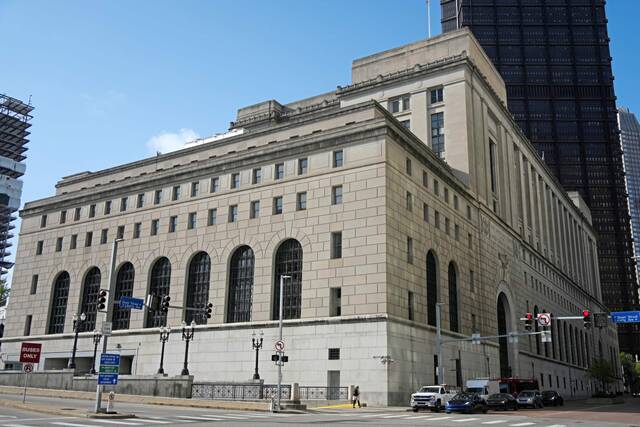The judge presiding over the trial of the man accused of killing 11 people at a Squirrel Hill synagogue has granted the government’s motion to conduct a psychiatric evaluation of the defendant.
U.S. District Judge Robert Colville issued a 23-page opinion Monday giving government experts permission to evaluate Robert Bowers, 50, of Baldwin “as necessary and probative to rebut or confirm defense experts’ anticipated mental health testimony.”
Any expert reports produced must be held in a sealed envelope by the clerk of court and their contents not revealed unless the case moves to a sentencing phase and Bowers proceeds with a mental health defense.
The defense previously said that Bowers has been diagnosed with epilepsy and schizophrenia. Any testimony relative to his mental health is expected to be used only in a sentencing phase of trial.
Bowers is accused of killing 11 people who were worshipping at the Tree of Life synagogue on Oct. 27, 2018.
The victims included Bernice Simon, 84, and her husband, Sylvan Simon, 86; brothers David Rosenthal, 54, and Cecil Rosenthal, 59; Dan Stein, 71; Irving Younger, 69; Dr. Jerry Rabinowitz, 66; Joyce Fienberg, 75; Melvin Wax, 87; Richard Gottfried, 65; and Rose Mallinger, 97.
The synagogue housed three congregations: Tree of Life-Or L’Simcha, Dor Hadash and New Light.
Bowers filed a notice in February that he would introduce mental health evidence. In early March, the government asked the court for permission to have a psychiatrist interview Bowers to complete a forensic examination and also have a neurologist complete a full evaluation.
The defense objected, saying the prosecution was seeking a “broad-ranging, invasive and constitutionally problematic investigation into Mr. Bowers’ life, mind and body” that is “wholly inappropriate.”
In his 23-page opinion, Colville said broad authority supports a psychiatric examination to provide meaningful rebuttal of mental health testimony presented by a defendant during sentencing in a capital case.
Colville also was critical of both sides and how they handled their court filings on this issue.
“Neither the government nor the defense has set forth an entirely reasonable set of requests with respect to the government’s potential examination of defendant. Each side has proposed diametrically and fundamentally opposed positions on the issue,” Colville wrote. “Neither side is without fault.”
The judge said the U.S. Attorney’s Office demand that any psychiatric examination be done at the federal courthouse is “unsupportable.”
He also wrote that the defense team insisting that the information they already provided to the Department of Justice on Bowers’ mental health negates the need for a government examination also was “unsupportable.”
Under the order, the government experts may question Bowers about the charged crimes and his conduct before and after, as well as any other matter they find necessary to rebut or confirm the expected testimony from the defense experts.
No counsel from either side may be present, and no recording is permitted unless Bowers consents.
Colville’s order lays out specific time frames for the testing and notes that he will not allow it to interfere with or delay the start of trial.
Jury selection in the case began April 24. Through 11 days of selection proceedings, 155 prospective jurors had been interviewed and 49 people were deemed eligible to be seated.
The panel will include 12 jurors and six alternates. The trial, once it begins, is estimated to last at least two months.
Under the order, the psychiatric testing must be completed prior to the guilt phase of the trial starting and, at the latest, directly following the completion of jury selection.
The government’s experts must provide their identities and resumes to the defense within 48 hours, as well as the testing they propose.
The examinations may not exceed 4½ days and may be conducted on contiguous days, including weekends, Colville said. A “day” consists of interviewing and testing of six hours, the judge wrote, while a half day is four hours.
The examinations are to take place at the facility where Bowers is being held and no earlier than five days after the experts provide notice of their identities and anticipated testing, Colville said.
He notes in the opinion that he will not automatically admit the results of the government’s experts’ examinations.








